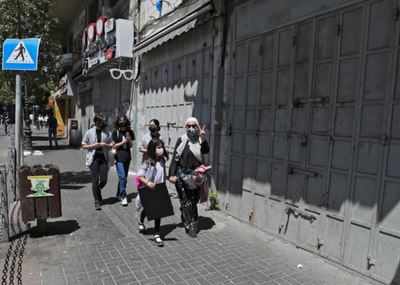[ad_1]

Palestinians walk past shuttered Palestinian stores in the city of Ramallah, as a general strike is observed in the occupied West Bank and Arab Israeli cities in solidarity with Gaza and Jerusalem (AFP)
GAZA/JERUSALEM: Cross-border fighting between Israel and Hamas appeared to abate slightly early on Tuesday, with no fatalities logged in Gaza for the first time since hostilities erupted on May 10, and fewer long-range Palestinian rocket attacks.
But a call by US President Joe Biden on Monday in support of a ceasefire appeared to go unheeded. Israel said it would press on, for now, with an offensive to destroy the capabilities of the armed factions Hamas and Islamic Jihad and rocket attacks continued.
The United States and other world powers have been pushing for an end to the fiercest escalation in the conflict in years, in which Gaza officials say 212 Palestinians, including 61 children and 36 women, have been killed.
There was no immediate word of Israeli casualties on Tuesday. Ten people have been killed in Israel, including two children, in previous Palestinian rocket or missile attacks.
In signs of a possible spread of the violence, the Israeli military said its troops shot dead a Palestinian who tried to attack them with a gun and improvised explosives in the occupied West Bank and that it downed an unmanned aerial vehicle (UAV) near the border with Jordan on Tuesday.
General strikes were held Tuesday in East Jerusalem, Arab towns within Israel and in the Israeli-occupied West Bank, with posts on social media bearing a Palestinian flag and urging solidarity “from the sea to the river”.
Palestinian businesses across East Jerusalem were shuttered, including in the walled Old City, and in the mixed Jewish-Arab port city of Haifa in northern Israel, protest organiser Raja Zaatar told Reuters the strike had closed 90% of businesses in Arab neighbourhoods.
Ra’afat al-Saman, a business owner in East Jerusalem’s Salahaddin street said he supported the strike.
The road is just a few minutes walk from Al-Aqsa mosque, the third holiest site in Islam, which lies in the heart of the walled Old City on the historic compound known to Jews as Temple Mount and to Muslims as the Noble Sanctuary.
“I think that people are more aware now. They close their businesses, they go to Al-Aqsa and to the streets, there are now more activities during a strike. In the past, people would go on strike and sit at home. I think that people are now more aware of the concept of a strike,” he said.
Hamas began its rocket assault last Monday after weeks of tensions over a court case to evict several Palestinian families in East Jerusalem, and in retaliation for Israeli police clashes with Palestinians near the city’s Al-Aqsa Mosque, Islam’s third-holiest site, during the Muslim holy month of Ramadan.
Yuval Steinitz, an Israeli cabinet minister from Netanyahu’s right-wing Likud party, deplored the strike as “another blow to the delicate fabric of relations and cooperation between Jews and Arabs” in an Army Radio interview.
The Gaza fighting, triggered by Palestinian anger over Israeli actions in Jerusalem, has triggered often violent Jewish-Arab unrest within Israel.
Broader conflict fears
Biden said Israel had the right to defend itself against indiscriminate rocket attacks but encouraged it to make every effort to protect civilians, the White House said of the call with Israeli Prime Minister Benjamin Netanyahu on Monday.
The Israeli military’s chief spokesman, Brigadier-General Hidai Zilberman, said it was continuing to operate in Gaza in accordance with a target list for the coming 24 hours.
“The IDF (Israel Defence Forces) is not talking about a ceasefire. We’re focussed on the firing,” he told Army Radio.
Gaza residents counted at least 60 Israeli strikes between midnight and 10 am (0700 GMT), a similar intensity to previous nights. But Gaza health officials said they had no reports of fatalities. Past tallies have been held up by difficulties in reaching bodies buried under collapsed buildings or bunkers.
In Israel, overnight sirens indicated Palestinian rocket salvoes were focussed on border communities rather than cities in the interior – despite a threat by Hamas on Monday to renew longer-range attacks on Tel Aviv.
Israel said more than 3,350 rockets have been launched at it from Gaza, some falling short and others shot down by its Iron Dome air defences. It says its forces have killed at least 140 Hamas or Islamic Jihad fighters in Gaza.
Egypt and UN mediators also stepped up diplomatic efforts, while the UN General Assembly will meet to discuss the violence on Thursday.
The top US military officer, Army General Mark Milley, warned on Monday that the violence could spread.
“My assessment is that you risk broader destabilization and you risk a whole series of negative consequences if the fighting continues,” Milley, chairman of the Joint Chiefs of Staff, told reporters before landing in Brussels on Monday for talks with NATO allies. “It’s in no one’s interest to continue fighting.”
US secretary of state Antony Blinken urged all sides to protect civilians.
He said he had not seen any evidence from Israel about its suggestion that Hamas was operating out of a building housing media outlets – including the U.S.-based Associated Press – which was destroyed in an Israeli missile strike at the weekend.
Hamas, which is designated a terrorist group in much of the West, denied having offices in the building. “These are false allegations and an attempt to justify the crime of targeting a civilian tower,” said Hamas spokesman Fawzi Barhoum.
FacebookTwitterLinkedinEMail
[ad_2]
Source link